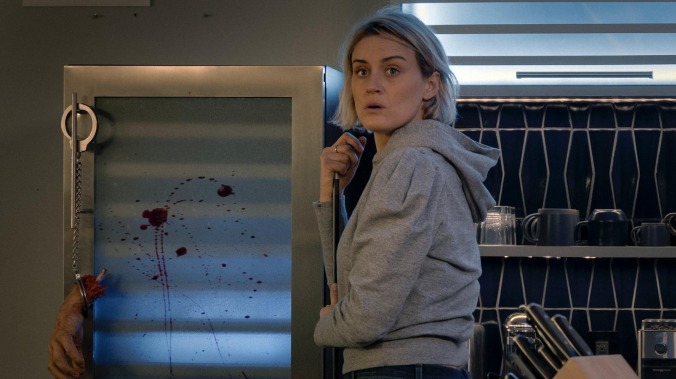The Bite’s COVID-meets-zombie satire really, well, bites


If only bad art were the worst thing to come out of the past year of lockdown. It takes a while to realize “bad art” is precisely the category into which The Bite falls, largely because of the caliber of talent involved. It’s not as though creators Michelle and Robert King (The Good Wife, The Good Fight) don’t have experience with outsized political comedy; their unfairly ignored CBS satire BrainDead went after knee-jerk Washington D.C. political obstructionism by suggesting that ant-like alien critters had taken over the brains of our elected officials, to breezily enjoyable results. So in what seems an obvious attempt to wring lemonade from the extremely hardcore lemons of 2020, the pair have striven to apply that same playful sensibility to our (thankfully dissipating, albeit slowly) pandemic predicament, by quite literally attaching a zombie virus to COVID-19, and letting the bloodthirsty results play out over the course of a couple days. Unfortunately, what previously felt fresh and lively is now wheezily clumsy, and the limp efforts at humor are mostly squashed by the clunky, unfocused satire and lack of general purpose brought to bear on this story. And much like the coronavirus itself, that failure of purpose takes awhile to come to light.
As with BrainDead, the tonal whiplash between campy absurdity and straight-faced drama takes some getting used to. But unlike that series, there’s nothing beneath the surface to justify committing to this zany premise. Beginning with a news report on “COVID fatigue,” the shows follows Dr. Rachel Boutella (Audra McDonald, giving this material her all) as she wearily goes through another day of Zoom appointments alone in her Brooklyn apartment, while her fellow doctor husband Zach (Steven Pasquale) is away helping spearhead the CDC’s COVID-19 response plan. We learn the pair are struggling to reconnect after a bout of infidelity, a bit of characterization that ends up not really paying off, just like a lot of the early setup. Meanwhile, Rachel’s upstairs neighbor Lily (Taylor Schilling, leaning more into how goofy all this is) continues her dominatrix work remotely, while prepping for a memoir on her life and profession to come out—a book her editor is pressing her to release under her own name, arguing that coming out publicly as a dom will only help boost sales. The pair’s lives start to overlap when Rachel consults on a patient who was bitten by a bag boy, the same day that Lily allows a dedicated client to spend the night in exchange for twenty thousand dollars—who also turns out to have a bite on his ankle.
Before you can say, “This sounds like the start of a zombie film” (and multiple characters do say exactly that, before being scornfully reminded that “zombies don’t exist”), the infected’s blood pressure drops to zero, they develop an involuntary jaw snap, and soon enough, they’ve transformed into unthinking, ravenous beasts. Or at least, some of them do; part of the problem of the series is that nothing, including symptoms of the zombies or how the virus seems to change them, is consistent enough across the arc of the show to function effectively as plotting, a bit of lazy world-building that gets waved away with an “it progresses differently for different people” dismissal.
Much of the meat of this limited series concerns Rachel and Lily’s efforts to work together, figuring out what’s causing this infection and how it can be stopped, all the while dealing with uncooperative government officials, combative patients, and the general obstinacy of a population refusing to take the situation as seriously as they should. (Zach also encounters plenty of foolishness from politicians and military brass in his similarly dispiriting work at the CDC.) This should offer plenty of opportunity for skewering the various responses to COVID-19 in this country, but the show’s offerings rarely amount to more than pointing out a lot of people act like morons—not exactly breaking news, and certainly not depicted in a fresh enough way here to make it feel like The Bite is saying anything that can’t be said just as effectively by a New Yorker cartoon, and with about as much insight.
Also, it’s a bit startling how ugly this series looks. From the set designs to the camerawork, it comes across as lazy and haphazard, the televisual equivalent of a low-rent summer stock theater. At first, this isn’t terribly noticeable; so much of the action takes place through laptop screens and phones, the viewer can be forgiven for thinking it’s merely symptomatic of the attempt to capture the grainy feel of our communication apps. But soon enough, it becomes apparent that the extra-diegetic shots don’t look any better than the ones supposedly coming from inside a MacBook, and the illusion shatters, leaving behind only the cheap production design of an especially unmemorable Lifetime movie.
It’s too bad the show slowly sputters out in a mawkish and ungainly mix of sentimentality and plodding action, because there are individual sequences that hint at what a successful version of this project could look like. Several sequences in which Rachel attempts to assist patients via Zoom as they deal with the infection are quite funny (patients only get more annoying in distanced appointments, it seems), and there’s a moment halfway through where it seems as though the series is going to genuinely suggest that singing is the solution to the virus. (It’s not, but wouldn’t that have been great?) Also, the fact that the world is crumbling, but the one person not missing a beat is the unflappable TaskRabbit delivery guy, is a good conceit. But Schilling gets MVP billing thanks to not one, but two Evil Dead 2-style brawls—one with a cartoonishly fake-looking infected cat and another, with a literal severed hand, has shades of Bruce Campbell—that she commits to with wide-eyed intensity and a hint of arch irony. Poor Audra McDonald, by contrast, gets saddled with the lion’s share of capital-D Dramatic Moments, none of which really land, thanks to the utter ridiculousness of everything surrounding them.
The Bite starts off clumsy and only gets worse, with those highlights mentioned above the rare exceptions. It’s satire without a clear target, drama without weight, and comedy without a very good sense of humor. Mostly, it feels like the creative team made the TV version of those sourdough starter kits so many people took up in quarantine: Sure, it’s a nice enough way to pass the time, but you certainly wouldn’t want to anyone else to have to take a Bite of your half-baked experiment.